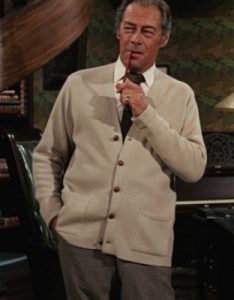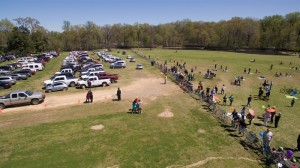 Nobody knows. The August 19, 2020 decision in Landis v. Washington State Major League Baseball Stadium Pub. Facilities Dist., 2019 WL 3891566 (W.D. Wash. Aug. 19, 2019) is thoughtful, thorough, and from the standpoint of those looking for certainty concerning the stadium sightlines argument inconclusive. The Court denied the plaintiffs’ request for a ruling that as a matter of law the T-Mobile Stadium at which the Seattle Mariners play failed to meet ADA requirements, but the Court found it could not do so without a trial. This is the inevitable result of the complexity of stadium design and impossibility of promulgating regulations concerning the location of wheelchair accessible seating that are both specific and cover every possibility. At trial the Court will hear more evidence and make fact findings about just what comparable sightlines means in this particular stadium, but that result will likely cover only the single stadium at issue, leaving other courts and other cases to determine on a stadium by stadium basis what is good enough. More
Nobody knows. The August 19, 2020 decision in Landis v. Washington State Major League Baseball Stadium Pub. Facilities Dist., 2019 WL 3891566 (W.D. Wash. Aug. 19, 2019) is thoughtful, thorough, and from the standpoint of those looking for certainty concerning the stadium sightlines argument inconclusive. The Court denied the plaintiffs’ request for a ruling that as a matter of law the T-Mobile Stadium at which the Seattle Mariners play failed to meet ADA requirements, but the Court found it could not do so without a trial. This is the inevitable result of the complexity of stadium design and impossibility of promulgating regulations concerning the location of wheelchair accessible seating that are both specific and cover every possibility. At trial the Court will hear more evidence and make fact findings about just what comparable sightlines means in this particular stadium, but that result will likely cover only the single stadium at issue, leaving other courts and other cases to determine on a stadium by stadium basis what is good enough. More
Public Facilities
“An atmosphere as quiet as an undiscovered tomb” – is that what the ADA requires?
By Richard Hunt in ADA Policies, definition of disability, Public Facilities, Reasonable accommodation, Restaurants Tags: ADA defense, Daniel Fink, hearing impairment, noisy restaurant
 In My Fair Lady Henry Higgins famously described his ideal room as having an atmosphere as quiet as an undiscovered tomb. Some anti-noise advocates would like to have the ADA impose this kind of requirement on every public accommodation. A recent news story* about this illustrates how little the press and public understand about what the ADA requires.
In My Fair Lady Henry Higgins famously described his ideal room as having an atmosphere as quiet as an undiscovered tomb. Some anti-noise advocates would like to have the ADA impose this kind of requirement on every public accommodation. A recent news story* about this illustrates how little the press and public understand about what the ADA requires.
The complaint that prompted the story is simple. If you have a hearing impairment then it is hard to understand conversation in a noisy public place like a restaurant.‡ In discussing this complaint the Washington Post article and the underlying paper by Daniel Fink ignore or misunderstand two things about the ADA – what it means to be disabled, what the ADA requires in the name of equality. More
Eternal liability under ADA Title – It’s what you don’t do that matters
By Richard Hunt in Accessibility Litigation Trends, ADA - Standing, Public Facilities, Rehabilitation Act, Title II Tags: ADA defense, ADA statute of limitations, ADA Title II, Babcock v Michigan, Frame v Arlington, Hamer v Trinidad
 I’ve observed before that titles II and III of the ADA create what can be called a crime looking for a victim.* The decision in Hamer v. City of Trinidad, 2019 WL 2120132 (10th Cir. May 15, 2019) shows how defining the crime can change the burden cities may face today based on decisions that go back decades or even centuries. The decision in Hamer will allow almost any person with a disability to demand that every inaccessible facility of a town like Trinidad be fixed regardless of its historical origin and regardless of how long the plaintiff has known of the problem. This decision contradicts decisions from other Circuits and follows a dubious analytical path. (For those who want a different view on this case, William Goren’s blog Repeated Violations Doctrine makes the case for this decision being correct). More
I’ve observed before that titles II and III of the ADA create what can be called a crime looking for a victim.* The decision in Hamer v. City of Trinidad, 2019 WL 2120132 (10th Cir. May 15, 2019) shows how defining the crime can change the burden cities may face today based on decisions that go back decades or even centuries. The decision in Hamer will allow almost any person with a disability to demand that every inaccessible facility of a town like Trinidad be fixed regardless of its historical origin and regardless of how long the plaintiff has known of the problem. This decision contradicts decisions from other Circuits and follows a dubious analytical path. (For those who want a different view on this case, William Goren’s blog Repeated Violations Doctrine makes the case for this decision being correct). More
ADA Standards – can you sit in a wheelchair while you stand at the bar?
By Richard Hunt in Accessibility Litigation Trends, ADA - serial litigation, ADA Bars, Design Build Discrimination, Public Facilities, Restaurants Tags: Accessibility Litigation, ADA defense, Bar accessibility, Frank Sinatra, Joni Mitchell, One for the Road, Raised on Robbery., Restaurant accessibility

 Must there a place at the bar for wheelchair users? Although there seems to be no relevant case law on the subject this is a contentious issue in many of the ADA cases we handle. It’s worthwhile to ask just what the ADA does or should require, or if that question can be answered based on the ADA and accompanying guidance and regulations.† More
Must there a place at the bar for wheelchair users? Although there seems to be no relevant case law on the subject this is a contentious issue in many of the ADA cases we handle. It’s worthwhile to ask just what the ADA does or should require, or if that question can be answered based on the ADA and accompanying guidance and regulations.† More
Temporary profits can mean a permanent problem under the ADA
By Richard Hunt in Accessibility Litigation Trends, ADA, ADA Policies, Apartments, Condominiums, Public Facilities, Restaurants, Retail, Shopping Centers Tags: accessible parking, ada litigation, parking lots, Public accommodation
 What’s wrong with this picture? You can be excused if you don’t immediately think, “no accessible parking,” but that might be the first thing that would come to mind for the defendant in Langer v. G.W. Properties, L.P., , 2016 WL 3419299, (S.D. Cal. June 21, 2016). Langer serves as a reminder that a business not usually covered by the ADA can become a “public accommodation” based on temporary use, and that this may lead to requirements for permanent changes. Commercial enterprises and apartment complexes should pay attention, as should any owner of raw land that allows it to be used for parking from time to time.
What’s wrong with this picture? You can be excused if you don’t immediately think, “no accessible parking,” but that might be the first thing that would come to mind for the defendant in Langer v. G.W. Properties, L.P., , 2016 WL 3419299, (S.D. Cal. June 21, 2016). Langer serves as a reminder that a business not usually covered by the ADA can become a “public accommodation” based on temporary use, and that this may lead to requirements for permanent changes. Commercial enterprises and apartment complexes should pay attention, as should any owner of raw land that allows it to be used for parking from time to time.

